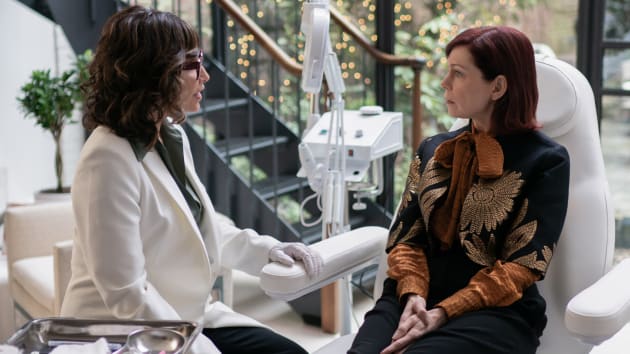[Warning: The following contains spoilers for the Season 3 finale of Killing Eve, “Are You Leading or Am I?” Read at your own risk!]
There is a brief moment near the end of Killing Eve‘s Season 3 finale, titled “Are You Leading or Am I?,” in which it seems the series has finally accepted what has been obvious to viewers for quite some time now: The shadowy organization known as The Twelve, and Eve’s (Sandra Oh) desire to expose and dismantle it, doesn’t really matter to the show’s ongoing narrative, and it is time to go cold turkey.
Nearly everything outside the complex relationship between Eve and Villanelle (Jodie Comer) is white noise at this point, existing only to pull characters’ strings and force them to dance around the proverbial chessboard to create the sense of still being a captivating spy thriller when the series long ago stopped being that and instead became an occasionally deep and interesting study on human desire as seen through the eyes of two women. Luckily, with Carolyn (Fiona Shaw) killing Paul (Steve Pemberton), allowing Konstantin (Kim Bodnia) not just to live but also escape, and then confessing to Eve and Villanelle that because she failed Kenny (Sean Delaney) as a parent and protector that she was responsible for his death and not Konstantin — who revealed Kenny had backed up and fallen off the roof after he tried to warn him to back off The Twelve — it seems the show is finally acknowledging it has evolved and moved beyond its original premise.
Find out what’s on tonight! Sign up for TV Guide’s daily recommendation newsletter
At least, I hope that’s what it means, because the BBC America drama is far more interesting when it explores the complexities of the two women at its center. While the show has never reached, and likely will never again reach, the heights of Season 1, the back half of the season was at least somewhat of an improvement on the early episodes, which felt like a poor copy or even parody of the show that took the world by storm when it debuted. As Villanelle struggled with her humanity and desire to prove she could be more than an assassin, Comer showcased more of her talents as she peeled back Villanelle’s layers. This was especially obvious in Episode 5, when she traveled home to Russia seeking answers from her past that could help explain her present or how she became the woman she is today. It all played out in predictable fashion, of course, with Villanelle eventually killing her mother after the older woman refused to take responsibility for Villanelle or the traumas that seemingly led her to this particular place, but the episode also really drove home how much better the show is when it stops trying to force The Twelve and the accompanying intelligence community storyline into the narrative.
This is why the final scene of the season, which found Eve and Villanelle in the middle of a bridge discussing their f—ed up relationship and Villanelle asking if she ruined Eve’s life while also confessing a desire to stop working for The Twelve stands out from the rest of the episode, and most of the season. The fact that both women try to walk away and leave each other behind but eventually turn around to acknowledge they can’t, and that this game they have been playing has changed them both is a poignant, if somewhat predictable, ending.
 Jodie Comer and Sandra Oh, Killing Eve
Jodie Comer and Sandra Oh, Killing Eve
The image of the two women being on the same page stands in contrast to the previous two season finales, which both ended with one woman attacking the other — first in an intimate stabbing, then a shooting in the back. When Season 3 premiered, I noted the show wouldn’t be able to move forward until someone made a move that wasn’t attacking the other and running away. This episode is an acknowledgment of the protagonists’ acceptance of each other and their complex desires. It could be the moment that finally changes everything. But instead of hoping for the show to move forward now, I wish it was the end; the final scene would have been an unsurprising but honest and fitting ending to the story of Eve and Villanelle. I now worry about what comes next, as the bridge of the finale is also acting as a bridge to next season, which will see Suzanne Heathcote pass the torch to Laura Neal as lead writer and executive producer.
Because Killing Eve has never had a consistent voice at the top, it has unfortunately never felt cohesive in its storytelling, with each season feeling like a separate vignette rather than an ongoing narrative, so it’s unclear what exactly Season 4 will look like, but here’s hoping that Neal and her writing staff continue to focus more on the complex inner workings of Eve and Villanelle rather than the shady organization that brought them into each other’s lives. Here’s hoping the show is truly, finally moving forward.
Killing Eve has been renewed for Season 4 on BBC America.







